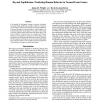Free Online Productivity Tools
i2Speak
i2Symbol
i2OCR
iTex2Img
iWeb2Print
iWeb2Shot
i2Type
iPdf2Split
iPdf2Merge
i2Bopomofo
i2Arabic
i2Style
i2Image
i2PDF
iLatex2Rtf
Sci2ools
104
click to vote
AAAI
2010
2010
Beyond Equilibrium: Predicting Human Behavior in Normal-Form Games
It is standard in multiagent settings to assume that agents will adopt Nash equilibrium strategies. However, studies in experimental economics demonstrate that Nash equilibrium is a poor description of human players' initial behavior in normal-form games. In this paper, we consider a wide range of widely-studied models from behavioral game theory. For what we believe is the first time, we evaluate each of these models in a meta-analysis, taking as our data set large-scale and publicly-available experimental data from the literature. We then propose modifications to the best-performing model that we believe make it more suitable for practical prediction of initial play by humans in normal-form games.
AAAI 2010 | Intelligent Agents | Nash Equilibrium | Nash Equilibrium Strategies | Normal-form Games |
| Added | 06 Dec 2010 |
| Updated | 06 Dec 2010 |
| Type | Conference |
| Year | 2010 |
| Where | AAAI |
| Authors | James R. Wright, Kevin Leyton-Brown |
Comments (0)

